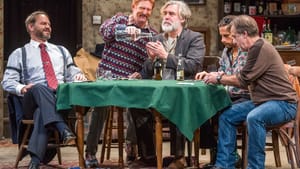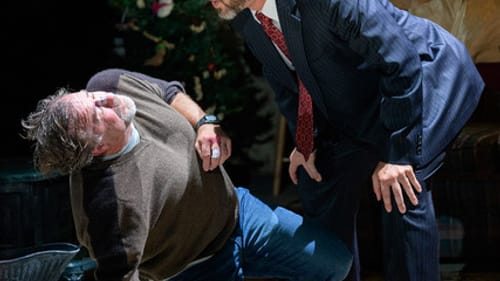Stay in the Loop
BSR publishes on a weekly schedule, with an email newsletter every Wednesday and Thursday morning. There’s no paywall, and subscribing is always free.
The highest stakes
University of Delaware REP presents Conor McPherson's 'The Seafarer'

The University of Delaware’s Resident Ensemble Players often open the season with hand-in-hand productions. Balancing Lettice and Lovage, now in the Studio Theatre — with its two strong female leads — is The Seafarer, Conor McPherson’s stunning 2006 drama for five men.
Ben Barnes — the renowned Irish director with a clear gift for staging this playwright — has crafted a thrilling, confident, and must-see realization of this superior drama.
Tale as old as time
The play’s title refers to an Old English poem, a first-person account of a man alone on the treacherous sea. The opening 26 lines, tantalizingly printed in the program (in both Anglo-Saxon and English), set up one of the play’s central metaphors: the challenge of creating a meaningful and spiritually resonant life.
Filled with overt Catholicism and awash in Irishisms only a Gael could write, The Seafarer at first promises to be a grim contemporary family drama. But it’s a morality play, seamlessly inserting an almost medieval situation into contemporary Irish life.
Always a day fraught with familial angst, it’s Christmas Eve in Baldoyle, a grimy coastal settlement north of Dublin where James “Sharky” Harkin (Lee E. Ernst) has come home to sober up and care for his brother Richard (Stephen Pelinski). Frequent visitors to their cluttered, dirty, and deteriorating house (and also to every local pub) are drinking buddy Ivan Curry (David Anthony Smith) and Nicky Giblin (Michael Gotch), a snazzy incomer now living with Sharky’s former wife.
Into the group Nicky brings a stranger: the mysterious Mr. Lockhart (Mic Matarrese). The four locals know each other’s feints, foibles, and fronts, but as they settle down for a holiday hand of poker with this newcomer, everything is upended.
McPherson’s characters are undergirded by warped spirituality and sullied by evil deeds; thus, evil itself enters their world. So it’s almost miraculous that Barnes and the playwright seamlessly transform this bleak world into one of universality and hope.

Seamless ensemble
This company is a seamless, powerful ensemble whose history creates a totally believable social net. At the forefront stands Ernst’s Sharky, whose life seems to be a long struggle toward something better that’s always just out of reach. Though the playwright has dramatic plans for Sharky, Ernst gives an edge-of-the-seat performance, never telegraphing his destiny.
Pelinski gives a striking and often frightening portrait of the recently blinded Richard. Alternately brotherly and full of rage, he's so filled with pride and independence he can’t admit to powerlessness. Smith’s hapless Ivan, in an eternal battle with his ever-waiting wife, always seeks his glasses, his car, and his way home. Gotch’s Nicky perfectly embodies the slick wife-stealer whose bravado masks personal and financial insecurity. And slowly revealing his hand as he slithers in among the group, Matarrese’s Mr. Lockhart crafts a chilling Faustian performance.
Stellar production elements move this piece forward. Todd Rosenthal’s set amazes with a lowering sky, exposed pipes, visible offstage rooms, worn-down furniture, and a sporadically working electric vigil candle in front of the Sacred Heart of Jesus. (Watch that red candle...)
Rachel Healey’s insightful costumes reveal character without ever devolving into caricature, though Ricky’s Christmas socks are a special treat. And listen for the clever sound design (Rob Milburn and Michael Bodeen): that seemingly unconnected music moves the plot forward.
The play culminates in a gripping game of high-stakes poker. “Time deepens in a game of cards,” says Mr. Lockhart, and “becomes bigger than you ever thought possible.”
Barnes (who also directs opera) absolutely understands this kind of scope — as he does every one of the playwright’s nuances. This is a thrilling play — a saga, really — thrillingly acted and told by a contemporary Irish bard with roots in his past and his face to the future.
What, When, Where
The Seafarer. By Conor McPherson, Ben Barnes directed. Resident Ensemble Players. Through October 7, 2018, at the University of Delaware's Roselle Center for the Arts, 110 Orchard Road, Newark, Delaware. (302) 831-2204 or rep.udel.edu.
Sign up for our newsletter
All of the week's new articles, all in one place. Sign up for the free weekly BSR newsletters, and don't miss a conversation.

 Gail Obenreder
Gail Obenreder